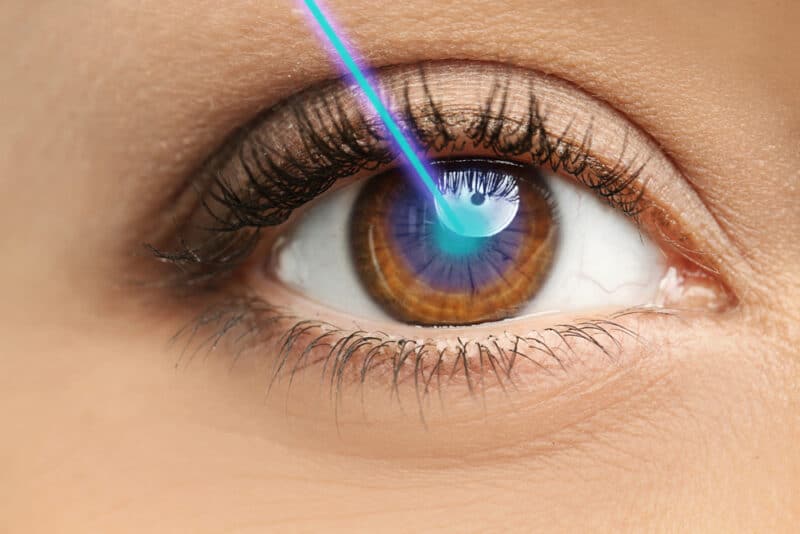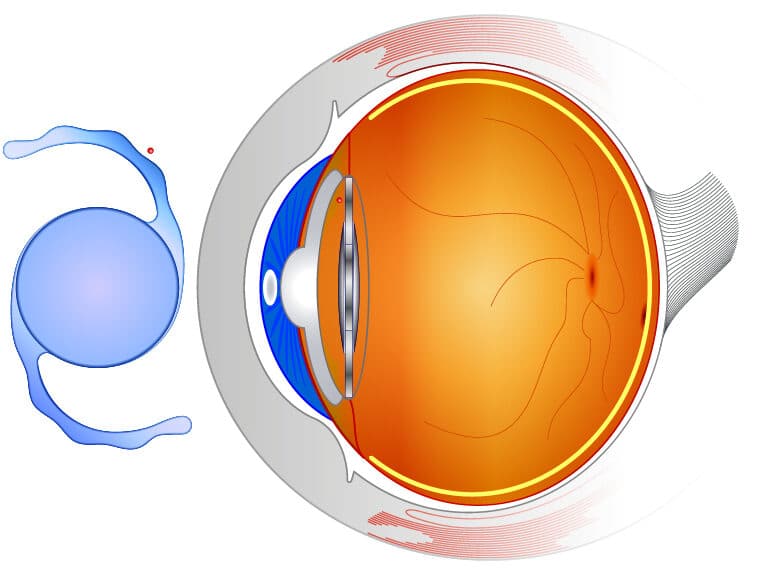Laser Vision Correction Center

LASIK Eye Surgery in Stockton, Lodi & Tracy
LASIK surgery at Delta Eye Medical Group’s Stockton, Lodi and Tracy locations is used to correct nearsightedness, farsightedness, and/or astigmatism. A complete eye exam will determine if you are a candidate for LASIK. LASIK is an outpatient procedure and takes only about 10 minutes per eye to complete. It’s done under topical anesthetic drops to eliminate pain. LASIK uses a laser to create a thin flap on the cornea, and a second laser to reshape the cornea (the clear covering of the eye where contact lenses are placed) to correct the way the eye focuses light rays on to the retina. LASIK often decreases or eliminates your dependence on glasses and contact lenses. As board certified ophthalmologists with subspecialty training in refractive surgery and corneal diseases, Dr. Jeffrey J. Ing and Dr. Julio Narvaez have special interest in offering LASIK surgery to their patients.
Are you a candidate for LASIK?
Some eye conditions that can make LASIK unsuitable for certain patients include:
- Keratoconus
- Cataracts
- Herpes infection of the eye
- Rheumatoid arthritis
Take our LASIK self-test to see if you are a good candidate for LASIK.
How is LASIK performed?
At Delta Eye Medical Group, we utilize the most advanced wavefront/topography-guided LASIK technology. iDesign captures over 1,200 measurements of each eye, creating a map that allows us to customize your laser treatment. The iFS 150 femtosecond laser is used to lift a thin layer of the cornea, and this is followed by an excimer laser that removes a precise amount of corneal tissue to reshape the cornea. This process is computer-controlled, and software-driven. After the laser treatment, the flap is repositioned and stays in place by natural corneal suction. Eye drops are used to moisturize and lubricate the eye. Most patients see great improvement in their vision soon after a LASIK operation. You should arrange to have someone drive you home after the procedure as vision may be slightly blurry and sensitive to light immediately following the procedure.
Recovery
The first couple of hours after surgery, the eye can feel somewhat irritated with a burning sensation and some tearing. Vision is typically blurry at this time. Do not rub the eye for the first few days to avoid disturbing the flap. Antibiotic and anti-inflammatory eye drops are given as well as eye drops to moisturize and lubricate the eye. Additional tips to help with recovery include:
- Rest as much as possible the first day
- Avoid activities that may strain your eyes, such as
- Watching TV for long periods of time
- Avoid getting water or shampoo in your eyes
- Refrain from swimming or using a hot tub
- Avoid activities that expose your eyes to smoke, dirt, or dust
- Refrain from wearing make-up
- Use caution when driving
Does insurance cover LASIK?
LASIK is not covered by health insurance and is considered an elective refractive procedure. We do offer financing. Call for more information.
Not a good candidate for LASIK? Learn more about LASIK alternatives.
Photorefractive Keratectomy (PRK)

What is PRK?
PRK permanently changes the shape of the cornea. The surgery is performed using topical anesthesia (drops). The ultraviolet light beam of the excimer laser is used to vaporize tiny amounts of tissue, one microscopic layer at a time, much like removing a few pages of a book without creating a LASIK thin flap. This process is computer controlled, and software-driven. The result is a change in the corneal curvature (shape), thereby reducing or correcting your nearsightedness and/or astigmatism. Although the goal of PRK is to improve vision to the point of not being dependent on glasses or contact lenses, or to the point of wearing thinner (weaker) glasses, and this is often achieved, this result is not guaranteed.
PRK is most often recommended for patients who have thin corneas with little room to create a corneal flap. The results for most levels of correction are identical to LASIK three months after surgery.
What is Clear Lens Extraction?
This surgery involves the removal of the clear lens of the eye, even though it is not a cataract. The natural lens will be replaced with an artificial implant called an intra-ocular lens in order to attempt to correct farsightedness, nearsightedness, and/or astigmatism so that natural vision will be improved, thereby reducing dependency on glasses or contact lens as a method of correcting the vision. In some cases, the lens may have an early cataract which does not significantly interfere with corrected vision, and which would normally not require surgical removal.

Examinations Prior to surgery
Patients undergo a complete eye examination by the LASIK surgeon. This will include an examination to determine the glasses prescription (refraction) both with and without dilating drops, measurement of the vision with and without glasses (visual acuity), measurement of the pressures inside the eye (tonometry), measurement of the curvature of the cornea, measurement of the length of the eye, intra-ocular lens calculation to determine the best estimate of the proper power of the implanted lens, a microscopic examination of the front part of the eye, and examination of the retina of the eye with the pupils dilated.
Anesthesia, Procedure and Postoperative Care
Light sedation is administered by an anesthesiologist while the eye is made numb by the LASIK surgeon usually with eyedrops. The natural lens in the eye will then be removed by breaking it up into small pieces with an ultrasound probe. These pieces are gently suctioned out of the eye through a small incision into the eye. This type of surgery is called phacoemulsification. After the natural lens is removed, the artificial lens of the power determined during the pre-operative examination will then be placed inside the eye. The incision required to perform this operation is often self-sealing but it may require closure with a very fine stitch (suture) which will be removed in a few weeks. After the surgery, the eye will be examined the next day, then at one week, 3 to 4 weeks, and at 3 months. During the immediate recovery period, I will place drops in the eyes for 2 to 4 weeks, depending on the individual rate of healing. After 4 to 6 weeks, glasses or contact lenses may still be required either for further improvement in the distance vision, reading vision, or both. I should be able to resume the normal activities within 2 or 3 days, and the eye will usually be stable within 3 to 6 weeks, at which time glasses or contact lenses could be prescribed.
Benefits of Surgery
Benefits to clear lens extraction are clearer, natural vision. The farsighted (hyperopic) eye is out of focus because the length of the eye is too short for the curvature of the outer lens of the eye (cornea), which causes light rays to focus behind the retina. The nearsighted (myopic) eye is out of focus because the length of the eye is too long for the curvature of the outer lens of the eye (cornea), which causes light rays to focus in front of the retina. The light rays can theoretically be brought to a clearer focus on the retina by substituting an artificial lens that has the proper power, thereby improving the natural focus of the eye. Although this can theoretically improve natural distance vision, if the calculations are accurate, up close vision will still require additional glasses for reading unless the implant is set for a close focus, unless a multifocal intraocular lens is used.


